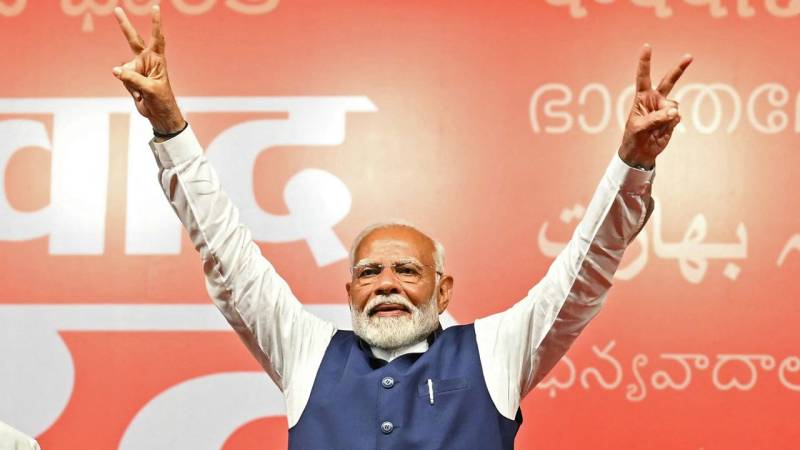
The world’s largest exercise of democratic franchise has ended, and the results show that India’s battered opposition has rebounded and the incumbent BJP, led by Prime Minister Narendra Modi, has lost its majority in Parliament for the first time in a decade. Modi will now be forced to turn to his coalition partners to stay in power.
Is this a turning point for Indian politics?
The results of the 2024 polls can partially be seen as a referendum of Modi’s brand of politics and leadership. The BJP’s considerable electoral machinery has spent the better part of the last decade fashioning and curating an unassailable cult of personality for Modi, portraying him as an invincible leader destined to deliver India to greatness.
Many have sought to describe Modi as “Teflon man.” Failed reforms, communal violence and massive protests seem to have done little to dent his popularity at the ballot box over the last decade – nothing has stuck. Only a few weeks before the election, Modi held a 75% approval rating. Seen in this context, the results of the 2024 election are a major setback for Modi and the BJP.
The results have shattered the illusion, and punctured through Modi’s carefully managed veneer of invincibility. India’s politics, given the sheer size and diversity of the electorate, has historically been defined by the formation of pluralist coalitions among regional parties and their interests.
The last decade under Modi has been viewed by many as a permanent shift in India’s democratic culture towards a personality-oriented form of politics, akin to a presidential system. That will not come to pass, it is now clear.
The BJP has lost over 60 seats in the 2024 polls, and on its own, has only managed to win 240 – still the highest tally of any single party, but well short of the 272 needed for a majority in the Lok Sabha. The BJP will likely still form the next government, but the survival of that government will hinge on the support of Modi’s coalition partners, many of whom like the Janata Dal (United) and the Telugu Desam Party have a history of going where the wind blows.
The “humbling of Modi,” as the Economist has described it, has been long overdue. In a viral interview before the election, Modi claimed that he was not born biologically, and had instead “been sent by God,” and he would set the agenda “for the next thousand years.” Those grand plans, not entirely dissimilar from Hindutva dictatorship, might not exactly come to fruition in a coalition government.
Modi’s party will have to learn conciliation and compromise if they want their domestic agenda to see the light of day. Modi will lose the ability to bulldoze through the institutions of the Indian state at will. The strongman will also face a revitalized opposition, which managed to put up a decent contest despite legal challenges and the use of state institutions to grant an incumbency advantage.
Why did the BJP’s narrative unravel?
Beyond the headline figures, India is largely a poor and underdeveloped country. Income inequality has gotten worse during Modi’s terms in office, and while the crony capitalists allied to the BJP like Adani have reaped windfalls, the unemployment rate for those under 30 is at 17%. For a large section of the Indian populace, the election manifesto’s promise of “Modi ki guarantee” (Modi’s guarantee) sounded hollow.
Inflation has also battered ordinary Indians, with food price inflation having influenced people’s voting decisions heavily.
The BJP was not helped either with the backlash against the decade long turn towards authoritarianism and increasing centralization. Significantly, intimidation and browbeating of regional political leaders who did not submit to the BJP or promise their unending loyalty and subservience seems to have taken an even bigger toll, especially in the Hindi heartland in central India where the party is the strongest.

